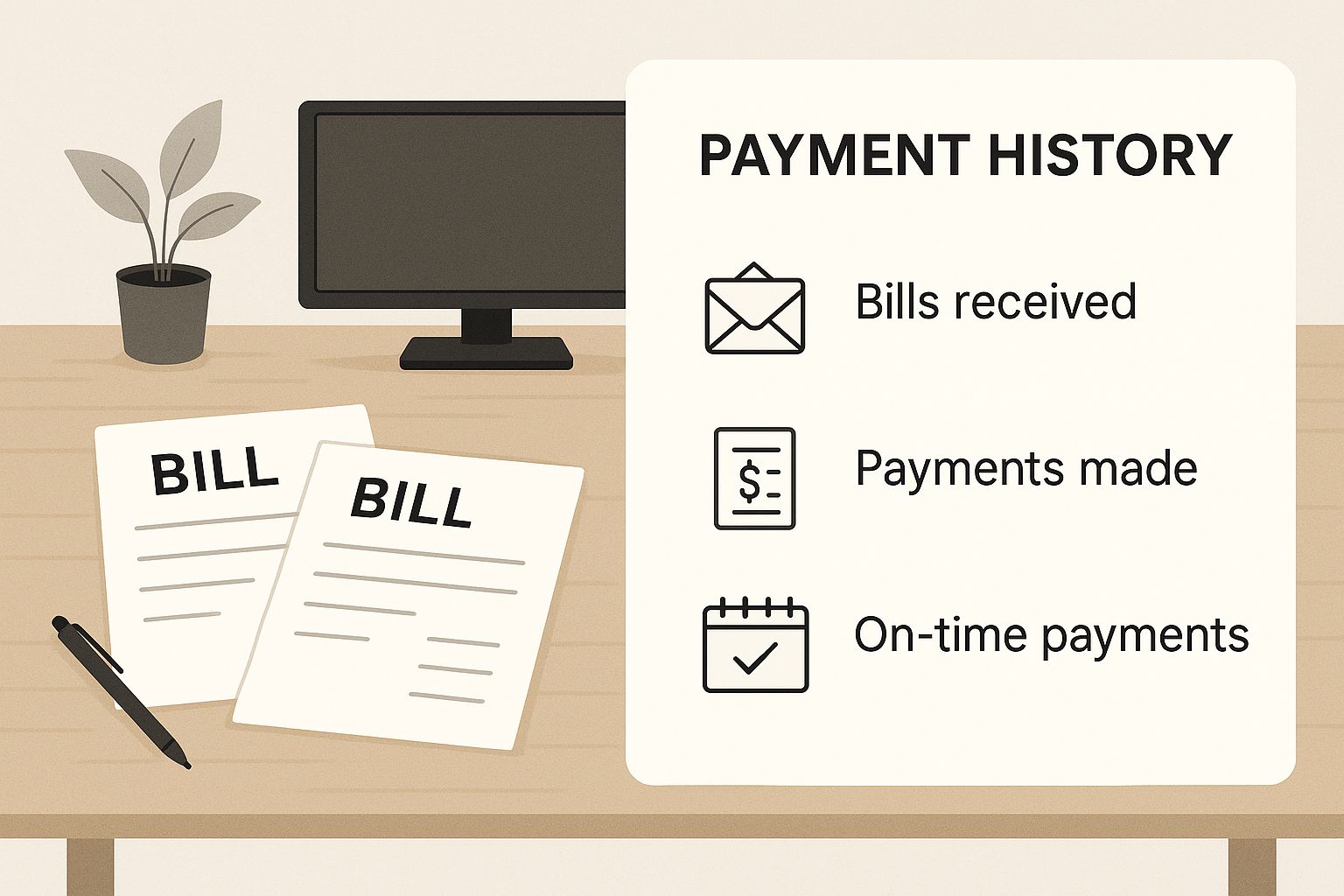What Affects Credit Score Most? Discover Key Factors Today

So, what's the single biggest thing that moves the needle on your credit score? The answer is simple and direct: your payment history. More than anything else, lenders want to see that you pay your bills on time.
Decoding Your Credit Score
It’s easy to think of your credit score as some complicated, mysterious number. But in reality, it's just a summary of your financial habits, boiled down from five key ingredients. Each one has a different level of influence, and once you understand the recipe, you can start to take control.
While making your payments on time is the heavyweight champion here, the other factors still pack a punch. They all work together to paint a picture of how you handle money.
The chart below gives you a great visual breakdown of what matters most.

As you can see, your track record for paying bills is the bedrock of your entire credit profile. It's a fundamental piece of information tracked across reports from different agencies, which is why it's so important to understand the role of all three credit bureaus in this system.
Let's break down the components that actually build your score.
The 5 Key Factors of Your Credit Score
To give you a clearer picture, this table lays out the five main ingredients of your credit score and roughly how much each one matters.
Think of these five factors as the building blocks of your financial reputation. While payment history and the amounts you owe make up the vast majority of your score, paying attention to all five is the key to building and maintaining excellent credit.
Payment History: The Foundation of Your Score

If you're wondering what affects your credit score the most, there’s one clear winner: your payment history. It’s the bedrock of your financial reputation and the single most important piece of the puzzle. Think of it as a long-term trust exercise with lenders—every on-time payment proves you're reliable, while a late one chips away at that confidence.
This factor carries so much weight because it answers the one question every lender has: "If we loan this person money, will they pay it back on time?" It's a simple idea with a massive impact on your score.
How Late Payments Hurt Your Score
Not all late payments are viewed the same. A bill that’s a few days late usually won't hit your credit report. The real trouble starts when a payment becomes 30 days past due, which is when creditors typically report it to the credit bureaus.
From there, the damage gets worse. A 60-day late payment hurts more than a 30-day one, and a 90-day late payment can be a wrecking ball to your score. The more recent the missed payment, the heavier its negative impact. And if an account gets sent to collections or is included in a bankruptcy, the damage is even more severe and sticks around for years.
The numbers don't lie. Payment history makes up roughly 35% of most credit scoring models. According to S&P Global, just one 30-day late payment could slash a good score by 60 to 110 points.
Building a Flawless Payment Record
The great news is this is the one area where you have nearly complete control. Consistency is your superpower here.
The Second Biggest Factor: How Much You Owe (Credit Utilization)

Right behind your payment history, the second most powerful influence on your credit score is your credit utilization ratio, often called CUR. It sounds technical, but it’s simply the percentage of your available credit that you’re currently using. This factor alone makes up about 30% of your FICO score.
Think of your total credit limit as a gas tank. If you’re constantly running on empty, it signals to lenders that you might be financially overextended. Keeping your balances low, on the other hand, shows that you have your spending under control and aren’t completely dependent on credit.
The Magic Number: The 30% Guideline
You’ve probably heard the advice to keep your credit utilization below 30%, and for good reason. It’s a widely accepted benchmark that works. This applies not just to your total credit across all cards, but to each individual card as well. So, if one of your cards has a 10,000 limit, you’d want to keep the balance under 3,000.
This isn't just a random tip. Data from major credit bureaus consistently shows that people who maintain a CUR below 30% tend to have much higher scores. Once you cross the 50% threshold, scores often start to take a serious hit. For more insights on these trends, you can explore Equifax's research on consumer credit.
How to Keep Your Utilization in Check
The good news is that you have a ton of control over this number. Even small adjustments can have a surprisingly big impact on your score.
Here are a few proven strategies:
Length of Credit History: Why Time Is Your Ally
When it comes to your credit score, time really is on your side. While it might not carry the same weight as your payment history, your length of credit history still plays a surprisingly important role, influencing about 15% of your overall score.
Think of it this way: a seasoned credit report is like a detailed professional resume. A long, consistent history gives lenders a much clearer picture of your financial habits, which makes you look like a more reliable and less risky borrower. If your history is short, it's not a black mark against you, but it does mean lenders are working with less information. This is a big reason why young adults or recent immigrants can have a tough time getting a high score right away, even if they've never missed a payment.
How Credit Age Is Calculated
So what does "age" actually mean here? It's not just about when you first opened an account. The scoring models focus heavily on the average age of all your accounts.
Let's break it down with a simple example. Say you have just two credit cards:
The math is straightforward: you add the ages (10 + 2 = 12) and then divide by the number of accounts you have (12 / 2 = 6). Just like that, your average account age is 6 years. This simple calculation clearly shows how opening several new accounts in a short period can pull down your average, and potentially your score.
The data backs this up on a global scale. People with excellent credit scores tend to have an average credit history of 10 years or more. In contrast, those with poor scores often have histories under three years long. A longer track record simply gives the scoring algorithms more data and more confidence in predicting your future behavior. If you want to see the numbers for yourself, these global credit history findings from S&P Global offer a fascinating look.
The Finishing Touches: Credit Mix and New Inquiries (Each 10% of Your Score)
https://www.youtube.com/embed/2HnWvlyIFSU
Now that we’ve covered the heavy hitters, let's look at two final pieces of the credit score puzzle. Together, your credit mix and new credit inquiries make up the last 20% (10% each) of your score. They might seem like minor details, but mastering them can give you that extra edge.
What Is Credit Mix?
Think of your credit mix as your financial portfolio. Lenders like to see that you can juggle different types of financial responsibilities at the same time. It shows them you're a versatile and reliable borrower.
A healthy mix typically includes both:
Having both shows you can handle different payment structures and schedules. But a word of caution: never open a new loan or credit card just to "improve your mix." The potential score bump is small and not worth taking on debt you don't actually need.
How New Credit Inquiries Affect Your Score
Every time you formally apply for new credit—whether it's a credit card, a mortgage, or a car loan—the lender pulls your credit report. This is called a hard inquiry, or a "hard pull," and it can cause a small, temporary dip in your score.
A few hard inquiries are no big deal; they're a normal part of being financially active. But a flurry of them in a short time can be a red flag for lenders, suggesting you might be desperate for cash or overextending yourself.
Thankfully, the scoring models are smart about this. If you’re rate-shopping for a big purchase like a car or a home, the FICO and VantageScore models understand you're looking for a single loan, not several. They typically bundle all related inquiries made within a 14- to 45-day window and count them as just one. This gives you the freedom to find the best possible interest rate without dinging your credit.
This is another great reason to stay on top of your credit report. Knowing what inquiries are showing up is one of the many benefits of what is credit monitoring.
Alright, let's put this knowledge into action. Think of this less as a rigid set of rules and more as a practical game plan. Building great credit isn't about some secret trick; it's about consistently nailing the fundamentals.
To get the best results for your effort, you need to focus on what moves the needle the most.
Tackle the Big Two First
Remember the pie chart? Payment history and credit utilization are the two biggest slices, making up a whopping 65% of your score. Getting these right is your top priority.
Polish Your Score with Smart Moves
Once you've got the basics down and they've become second nature, you can start fine-tuning things with these other factors.
Common Questions We Hear About Credit Scores
Once you start digging into the world of credit, a lot of specific questions tend to pop up. Let's walk through some of the most common ones I hear from people. Getting these answers straight can clear up a ton of confusion and give you the confidence to manage your credit like a pro.
Does Checking My Own Score Hurt It?
This is probably the biggest myth out there, and I'm happy to report the answer is a firm no. When you pull your own credit score or report, whether it's through a monitoring service or directly from the bureaus, it's logged as a soft inquiry. Think of it as a personal check-in.
These soft inquiries are completely invisible to lenders and have zero effect on your score. So please, check your score as often as you need to! It’s like glancing at your car's speedometer—it’s just smart monitoring. The one that does ding your score is a hard inquiry, which only happens when a lender formally pulls your report for an application.
Does My Income Affect My Credit Score?
Not directly, no. Your credit report doesn't list how much you make, so the scoring models have no way of factoring it in. You can have a six-figure salary and a mediocre score, just as you can have a modest income and an excellent score.
That said, income plays a huge indirect role. Having more money certainly makes it easier to pay your bills on time and keep your credit card balances low, which are the two heavy hitters in your score. Lenders will also look closely at your income and debt-to-income ratio for the final loan decision, but your score itself is all about your credit habits.
Will Closing an Old Credit Card Help My Score?
It's tempting to do a little financial spring cleaning and close out old cards you never use, but this is one of those moves that can accidentally hurt you. Closing an old account, especially your oldest one, can damage your score in two ways.
My advice? Unless the card has a steep annual fee you can't get waived, it's almost always better to keep it open. Just make a small purchase on it every six months or so to ensure the issuer doesn't close it for inactivity.
Stop guessing and get the full picture of your credit health. With All3Credit, you can monitor your scores from all three bureaus in one simple dashboard. This gives you the clarity you need to make smarter financial moves, see what's impacting your score, and track your progress—all for just $12.99 a month. Take control by starting your journey to a better score at https://www.all3credit.com.